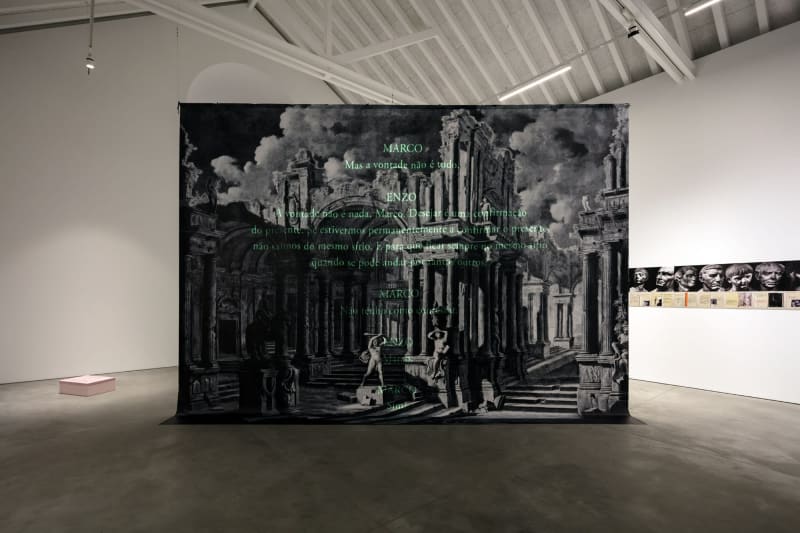La Morte del Desiderio: Vasco Araújo
Dear,
It’s about two in the morning and, despite some doubts, I’ve just finished the last work for my first show at Galeria Francisco Fino, which is titled La Morte del Desiderio. This letter is about the show, but it’s also about our experience… as human beings. So, I’ll start: “He knows that this mirror reflects the face that deceives him…he is still young, barely able to recognise his own mistakes…”
As I write these words, I doubt their reality. I doubt the reality of the being that they designate. I myself, us, all of us – do we exist? Am I, are we, something other than the projection of a desire, or rather, the death of desire? The most reasonable explanation that I am able to find for my thoughts is that there is in us an idea of desire that is based upon an idea of future, a certain and idealised idea of future. “This realistic image was made from the wax mask obtained by application to the face of the deceased.”
When we pursue desire, we try to satisfy or fulfil a certain idea in a future (near or distant). That idea is in chains, it is fixed and established a priori. This implies a certain notion of future: future as the coming to fruition of a thought from the present. “Dead time…”, in which the surprises of destiny appear in succession, along with equivocations of grandeur, fallacious intentions, misunderstood hunches, a tendency to let life pass us by. It is an idea of future that is not available for the unforeseen. An idea that shows, with almost imperceptible irony, that human beings are plunged in a world that surpasses them, that defeats them, and how their true greatness consists in being equal to that very defeat. This idea of desire is therefore based on a certain idea of correspondence between thought and the coming to fruition of thought, but it is a correspondence condemned to fail (what is thought never corresponds to what happens) – “nothing… ceaselessly nothing … not even unhappiness. All becomes memory, fear of memory?… All of this is just the ruins of our passage.”
Another identitary human feature for this idea of desire/failure has to do with the need to build an enemy as the mirror of oneself, “To have an enemy is important not only to define our identity, but also to find an obstacle to measure our value system against and display our valour by facing him? Which is why when there isn’t an enemy one must be made.” This enemy is our mirror, in the sense that it reveals, that it truly shows our character, behaviour and attitude to what is opposed to or different from us, but it also serves to define and rediscover our identity at every passing second. “Don’t be like that… there’s no physical torture, there’s no truth! Nevertheless, we’re in hell. And no one else should come here. No one. We’ll stay until the end, only the two of us, together (…). Only the henchman is missing (…). They’ve cut down on staff. That’s all (…). The henchman now is in each of us, in one another.”
I am still somewhat doubtful and capricious about our existence. “Cappriccio”, from the Italian, is an arbitrary decision or requirement whose origin is to be found in will. It’s also an attempt to find another idea of desire that might be available for the unforeseen. In that sense, “not to desire” corresponds to a liberation of the subject, as well as to a will (desire) to live the future, whatever it might be. This position does not imply a de-responsabilisation of the desiring subject, but rather an awareness that desires are multiple, mutable, ever imperfect constructions…
Well, I am tired, I’ll stop for a few moments… I’ll, I’ll call a friend inviting him to write the script for a film that will not be shot, with hidden characters and unsatisfied wills.
I leave you with a few sentences that I took down amid these thoughts and are a sort of consolation and remembrance of days past, of fascinations or of all that bleeds away but leaves an indelible trace:
“Most of the time, tears are the last smile of love”
“Happiness and desire do not mix”
“Possession is the tomb of desire”
“In love there is much toil”
“Never to have been disillusioned in love is a privilege of the imbecile”
“Love is paid with love”
“Many a good wish buries itself”
“When desire is stopped, enjoyment is null”
“All desire comes from need, deprivation, suffering”
until always…
Vasco Araújo



